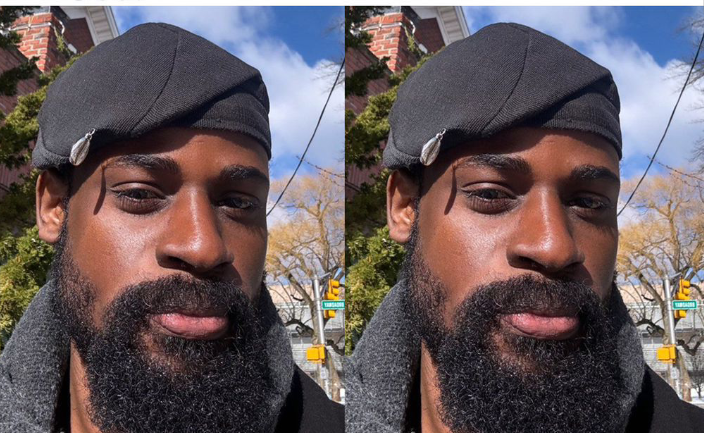
“We Are a Fucking Failed Society” – KlintonCod Sparks Heated Reactions as He Calls Out GehGeh’s Influence on Nigerian Youths

Nigerian comedian and social commentator KlintonCod has ignited a storm of conversations across social media after a fiery statement in which he appeared to criticize the influence of trending online personality, GehGeh, whose popularity has soared dramatically among Nigerian youths. The comedian, who has built a reputation for blending humor with thought-provoking insights, did not mince words when he addressed the kind of content that has become a magnet for young Nigerians in recent times. His blunt remark, “We are a f***ing failed society,” has now become a trending phrase, sparking both agreement and backlash across the country’s digital space.
The controversy began when KlintonCod took to his official X (formerly Twitter) account to express his dissatisfaction with what he perceives as misplaced priorities among Nigerian youths. In his post, he referenced GehGeh’s ability to pull massive attention with what he described as trivial conversations. “A guy wakes up and all his topic of conversation is tu:this, tcɔ that, and he pulls 25k Nigerian youths mostly guys to come listen, I will not hide my mouth o, we are a f***ing failed society mehn,” he wrote, clearly indicating his disapproval of the kind of influence certain online figures are commanding over young people in the country.
GehGeh, a rising internet sensation known for his quirky phrases, playful slang, and casual banter, has gained significant traction over the last few months, with his catchphrases becoming part of everyday conversation among Nigerian youths. His live sessions, which often focus on lighthearted and sometimes absurd topics, have managed to attract thousands of live viewers consistently, making him one of the most talked-about online personalities at the moment. For many of his fans, GehGeh represents humor, escape, and entertainment in a country where stress, hardship, and economic frustrations are the daily reality. However, KlintonCod’s comments suggest a deeper concern about the implications of such trends on society’s values and direction.
The comedian’s statement quickly sparked mixed reactions online. Supporters of his view argued that the obsession with personalities like GehGeh reflects a societal failure, pointing out that Nigerian youths often channel more energy into entertainment and fleeting trends than into meaningful conversations about leadership, education, or innovation. According to them, KlintonCod’s criticism, though harsh, is a wake-up call to a generation that seems more invested in chasing viral trends than in building a future for themselves. Many agreed with his observation that if an online influencer can draw tens of thousands of viewers with what some deem “empty talk,” then the youth’s focus is indeed misplaced.
On the other hand, fans of GehGeh and those who oppose KlintonCod’s stance rushed to defend the popular personality, arguing that entertainment should not be demonized, especially in a society already plagued by stress and hardship. To them, GehGeh provides comic relief and joy in an environment where young people are constantly battling unemployment, inflation, insecurity, and an uncertain future. They argue that it is unfair to blame society’s failure on entertainment figures who are only giving people a reason to laugh and unwind. “People go to GehGeh’s live because it’s fun, it’s entertaining. Not everything has to be serious all the time. Life is already hard enough,” one social media user posted in defense of the internet star.
Beyond the debate about GehGeh, KlintonCod’s comment touches on a larger and more uncomfortable truth about the state of Nigerian society. Many Nigerians have long lamented the lack of focus on education, personal development, and societal advancement among the youth, who instead often flock to entertainment, gossip, and trends as their main source of engagement. Critics argue that this collective distraction has contributed to the inability of young people to unite around pressing issues such as governance, corruption, and the fight for better opportunities. They believe KlintonCod’s use of the phrase “failed society” reflects frustration with how misplaced priorities continue to hinder the progress of a generation that should be at the forefront of innovation and change.
Still, there is no denying the complexity of the issue. While some agree that Nigerian society has failed its youth by not providing an enabling environment for growth, opportunity, and success, others insist that young people also carry a responsibility to resist the temptation of trivial distractions and instead focus on building themselves and their communities. For many, KlintonCod’s statement is a challenge to re-examine what young Nigerians choose to celebrate and amplify. Why do voices like GehGeh’s command such massive attention while conversations around serious issues such as policy reforms, business opportunities, or technological advancement struggle to gain similar traction? The uncomfortable answer may indeed support KlintonCod’s argument that something fundamental is broken in the society’s value system.
In typical Nigerian fashion, the debate has also been laced with humor, memes, and sarcasm. Some users have jokingly adopted KlintonCod’s phrase “failed society” as a new slang, while others have created skits and short videos satirizing the clash between entertainers and social critics. Yet beneath the jokes lies a serious national conversation about where Nigeria is headed and whether the youth can rise above entertainment culture to demand and create real change.
GehGeh himself has not directly responded to KlintonCod’s criticism, but several of his loyal fans have continued to flood social media with support for him, insisting that he represents a harmless form of fun in a society that gives little else to smile about. Some even suggested that KlintonCod’s criticism stems from jealousy or frustration at GehGeh’s sudden rise to fame and influence, although others dismissed that interpretation as an oversimplification of a deeper issue.
What remains clear is that KlintonCod has successfully sparked one of the most heated online debates of the month. His words, raw and unfiltered, have forced Nigerians to confront uncomfortable questions about entertainment, influence, and values. Whether one agrees with him or not, the fact that his post has gone viral and dominated conversations proves that the question of where Nigerian youths are directing their attention is one that cannot be ignored.
As the conversation rages on, it seems KlintonCod’s controversial remark has achieved something far greater than the criticism itself: it has sparked reflection. It has made Nigerians pause, however briefly, to consider what kind of society they are building and what role their entertainment choices play in shaping that society. Perhaps that was his intention all along, to shake people out of complacency and to call attention to the larger issues that are too often buried beneath the noise of trends and banter.
Whether KlintonCod’s words will inspire a genuine shift in mindset or whether the debate will fizzle out as just another online trend remains to be seen. But for now, one thing is certain: his declaration that “we are a f***ing failed society” has struck a nerve, and the echoes of that statement will continue to resonate in Nigeria’s digital and cultural conversations for weeks to come.


